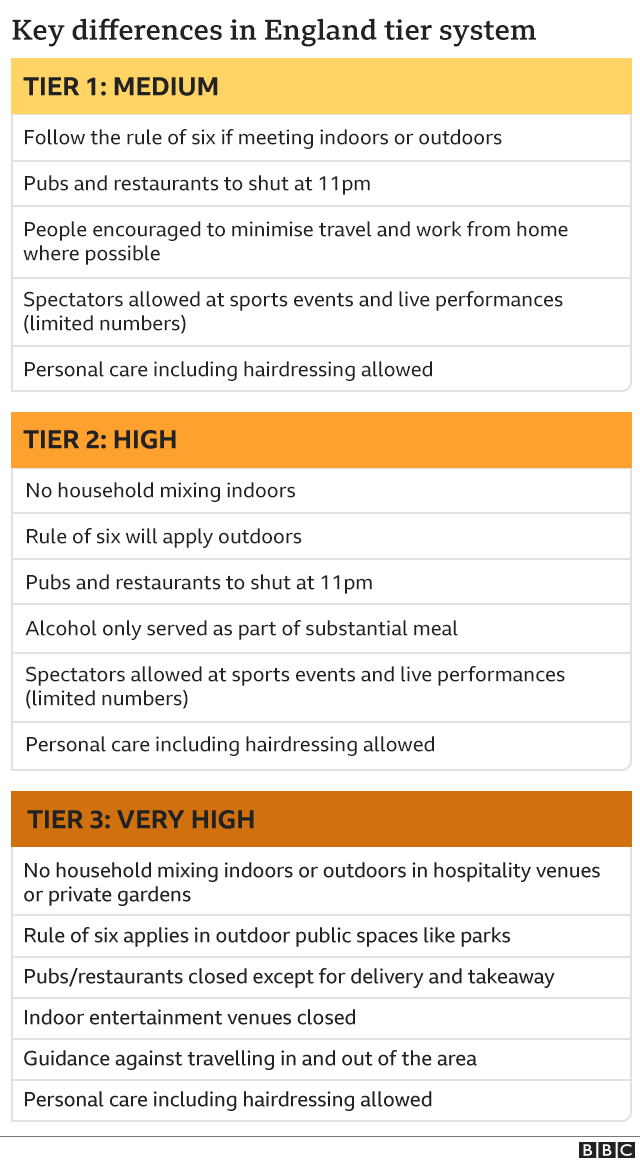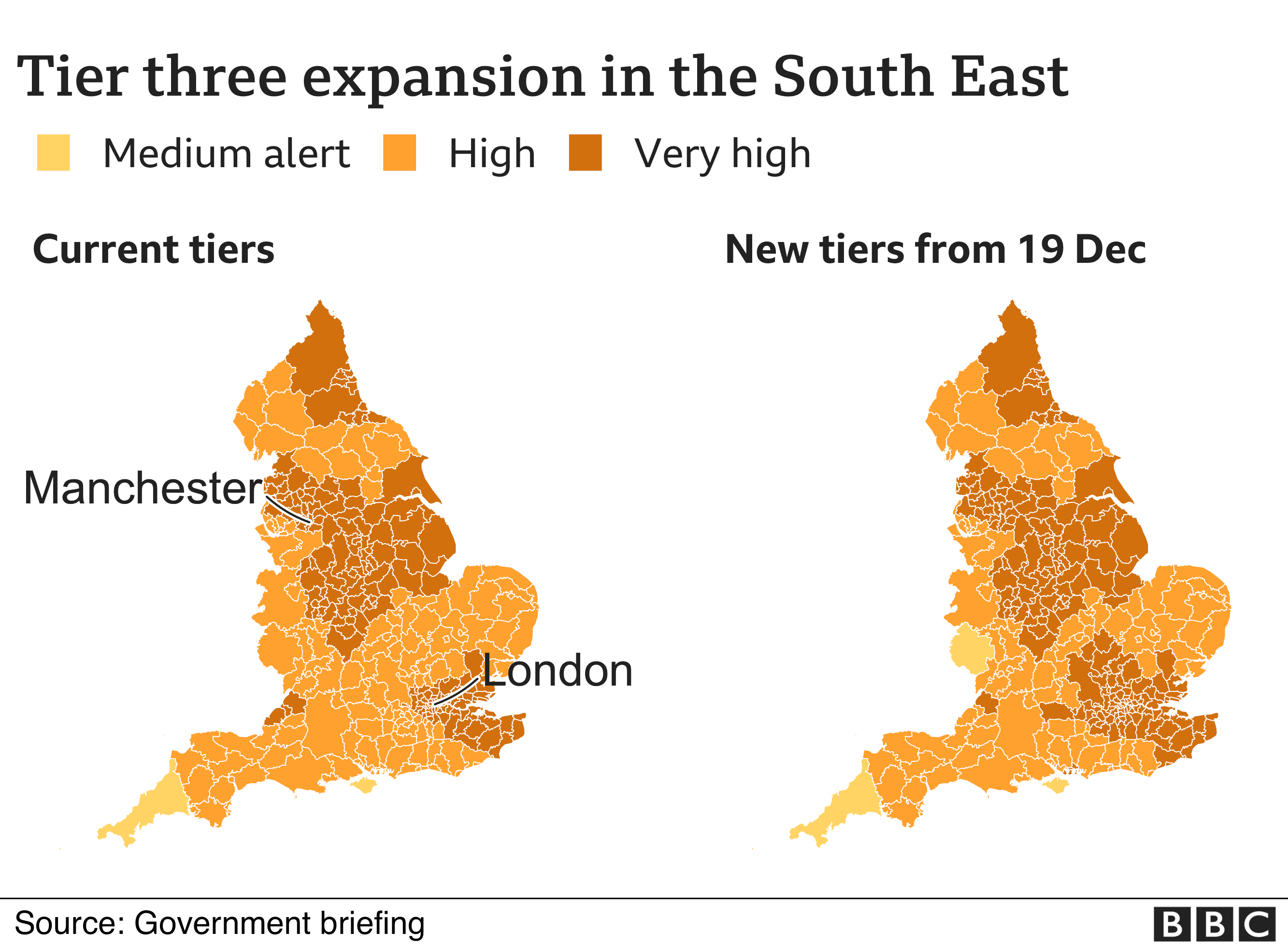Millions of people in the east and south-east of England will face the toughest Covid-19 rules from Saturday, the health secretary has said.
Bedfordshire, Buckinghamshire, Berkshire and Hertfordshire will be subject to tier three rules, as will parts of Surrey, East Sussex, Cambridgeshire and Hampshire.
Swathes of the country already in tier three will remain there.
Matt Hancock told MPs: "We've come so far, we mustn't blow it now."
Bristol and North Somerset will move from tier three to tier two, and Herefordshire will move from tier two into tier one.
The changes come into effect at 00:01 on Saturday.
It means that 68% of England's population - 38 million people - will be living in tier three from the weekend.
Labour leader Sir Keir Starmer said he was concerned the tier system was "just not strong enough to control the virus".
"We've been seeing the numbers going in the wrong direction across the country in the last seven days in particular," he added.
Greater Manchester mayor Andy Burnham said he was "not surprised but very disappointed" that the region was staying in tier three, having called for some parts to be downgraded.
He told BBC Radio 4's World at One that Greater Manchester has lower infection rates than Liverpool and London had "when they were originally put into" tier two.
"It feels like if... London and the South East has rising cases, everyone stays under restrictions," he said.
From Saturday, some 30% of the population will be in tier two, while just 2% will be in tier one.


Announcing the outcome of the first formal review of the new tiering system in England, Mr Hancock said "no-one wants tougher restrictions any longer than necessary".
However, he said "these are always the most difficult months for people's health" and we "must keep suppressing this virus".
Cases have risen by 46% in the past week in the south-east of England, he told MPs, and were up by two-thirds in the east of England.
He added the restrictions are "thankfully not the only tool we have to fight the disease" and that Education Secretary Gavin Williamson will "set out further detail on testing in schools" later.
It is expected to be announced later that the return to school in January will be staggered for secondary pupils in England, with some starting term online rather than in class.
Secondary school age children are one of the groups with the highest infection rates.

Which areas are changing tiers?
The health secretary said from 00:01 Saturday 19 December:
- Bedfordshire, Buckinghamshire, Berkshire, Peterborough, the whole of Hertfordshire, Surrey (except Waverley), Hastings and Rother, Portsmouth, Gosport and Havant will move into tier three.
- Bristol and North Somerset will be moved down to tier two.
- Herefordshire will move from tier two to tier one.





With the majority of the country in the highest tier, many will be wondering how long it will be before the rules are relaxed.
Tier three now contains a variety of different patterns.
Large parts of the North have seen cases fall and now have lower than average infection rates, although there are signs those decreases have stalled.
Other areas, such as some of the home counties, have low rates that are rising.
But there are places - east London and the surrounding areas - that have high rates that are rising.
The fact that they are all in tier three is a sign of caution from ministers.
That, of course, is because of the Christmas relaxation - and fear it could lead to a spike in cases.
If that happens, tier three could become the norm for months - maybe accompanied by a third lockdown.
That would leave the government and public pinning everything on the vaccine programme.
Earlier this week, ministers said a good start had been made with more than 137,000 people vaccinated.
But there are more than 25 million in the priority groups - 12 million of them over the age of 65.
In theory, two million could be vaccinated every week, but that depends on multiple things going right.
The fear is this could become the status quo for many until the spring.

Some 34 million people have already been living under tier three rules.
London, most of Essex and parts of Hertfordshire were placed under the strictest curbs on social contacts on Wednesday.
They joined much of the Midlands, north-west England and north-east England.
Andrew Gwynne, Labour MP for Denton and Reddish in Greater Manchester, said keeping the region in tier three was "yet another blow for our hospitality".
In a tweet, he said he worried that "we are trapped in this system arbitrarily".
"Despite our cases dropping, we are now being held back because of the utter mess government has made of its Christmas relaxation rules," he said.
Leaders in areas moving from tier two to tier three also expressed their concerns.
Stephen McPartland, Conservative MP for Stevenage in Hertfordshire, tweeted that it was "ridiculous" the town is "being dragged into" tier three.
He said tiers "should be imposed on a district basis instead of this unbalanced county-wide approach".
Gerald Vernon-Jackson, the Liberal Democrat leader of Portsmouth City Council, said the decision to introduce the toughest measures there was "bizarre".
He said he was "slightly surprised" because he had been told that "the problem" was with the city's Queen Alexandra Hospital.
However, the hospital also serves nearby local authorities, such as Fareham and Winchester City, which were not being moved up.
"The government has made a number of bizarre decisions, so it's no surprise they have made another one," he said.

- SOCIAL DISTANCING: Can I give my friends a hug?
- FACE MASKS: When do I need to wear one?
- TESTING: How do I get a virus test?
- SYMPTOMS: What are they and how to guard against them?

Meanwhile, BBC News understands that health officials in Northern Ireland have proposed a six-week lockdown in an attempt to curb the spread of the virus.
In Wales, non-essential shops will close from the end of trading on Christmas Eve, with an alert level four lockdown starting four days later.
And in Scotland, the deputy first minister warned that tougher restrictions - including a potential lockdown - after the festive period cannot be ruled out.

- GREG JAMES' CHRISTMAS TAKEOVER: 60 minutes of festive bangers chosen by you
- GROUNDED WITH LOUIS THEROUX: Rylan Clark-Neal reveals how one of Louis’s documentaries ignited his teenage sexuality


What are your plans for Christmas? How will you be affected by the rule changes? Share your experiences by emailing haveyoursay@bbc.co.uk.
Please include a contact number if you are willing to speak to a BBC journalist. You can also get in touch in the following ways:
- WhatsApp: +44 7756 165803
- Tweet: @BBC_HaveYourSay
- Please read our terms & conditions and privacy policy
If you are reading this page and can't see the form you will need to visit the mobile version of the BBC website to submit your question or comment or you can email us at HaveYourSay@bbc.co.uk. Please include your name, age and location with any submission.
https://news.google.com/__i/rss/rd/articles/CBMiJmh0dHBzOi8vd3d3LmJiYy5jby51ay9uZXdzL3VrLTU1MzUwMDg10gEqaHR0cHM6Ly93d3cuYmJjLmNvLnVrL25ld3MvYW1wL3VrLTU1MzUwMDg1?oc=5
2020-12-17 14:17:00Z
52781247698161
Tidak ada komentar:
Posting Komentar